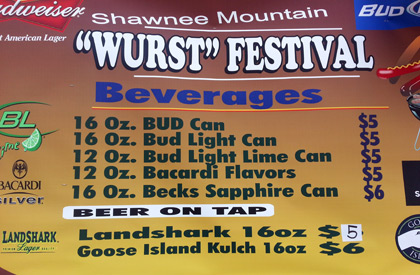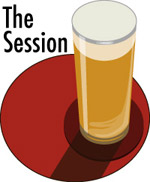
Session #77 wrapped up
 Justin’s Brew Review has posted the roundup for The Session #77: Why IPA is a Big Deal. That 32 bloggers found time to write provides a bit of commentary unto itself.
Justin’s Brew Review has posted the roundup for The Session #77: Why IPA is a Big Deal. That 32 bloggers found time to write provides a bit of commentary unto itself.
Justin provides a summary, although (as always) reading the full post (and clicking a few links) is recommended:
1. HOPS! for the taste/flavor
2. Different than mass-produced “macro” beer
3. Hype/abundance of supply
Mitch Steele is blogging (eom)
(eom) except for a link, of course:
A Brew’s Who Of The Millennium
Remember last January when First We Feast posted a list of The 20 Most Influential Beers of All Time, inspiring Martyn Cornell, Mr. Zythophile, to counter with The REAL 20 most influential beers of all time?
More than 200 comments followed, and way toward the end somebody suggested, “Perhaps Martyn could start another list of the 20 most influential people!”
And he answered, “I am indeed considering that very thing.”
Every day I get up thinking, “Today will be the day.” Then I check Zythophile. I have learned to live with heartbreak.
Then today, while I was researching a pretty much unrelated story I bumped into the 1999 issue of American Brewer in which Greg Kitsock assembled such a list. “A Brew’s Who Of The Millennium: 25 Of The Most Significant Figures In Brewing Over The Last 1,000 Years” actually includes more than 50 names. He ended up with two lists of 25 (and in some cases had more than one name in a position), dividing them into B.J. and A.J. — Before Jack (McAuliffe) and After Jack. Kitsock explained in the introduction that the focus was on the profession of brewing. And when reading A.J. remember the list was compiled in 1999.
The top 25 B.J.
1) Louis Pasteur
2) Ferdinand P.A. Carre
3) Williams IV, Elector of Bavaria
4) Arthur Guinness
5) Adolphus Busch
6) Joseph Groll
7) Sir William Gladstone
8) George Hodgson
9) King Ludwig I
10 James Watt
11) Ralph Harwood
12) William Bass
13) Gerard Adriaan Heineken
14) Emil Hansen
15) Daniel Wheeler
16) Gabriel Sedlmayr the Younger and Anton Dreher
17) Jean Primus
18) Wayne Wheeler
19) Michael Combrune
20) Maximilian I
21) Jean De Clerck
22) Antoine-Laurent Lavoisier
23) Carl Joseph Napolean
24) Saint Hildegarde
25) Robert Burns
The Top 25 A.J.
1) Michael Jackson
2) Jim Koch
3) August Busch III
4) Bob Lenz
5) Henry King
6) Bert Grant
7) Michael Hardman, Graham Lees, Jim Makin and Bill Mellor
8) Charlie Papazian
9) Fritz Maytag
10) Paul Shipman
11) Paul Camusi and Ken Grossman
12) Bill Coors
13) Robert Uihlein
14) Jack McAuliffe
15) Candy Lightner
16) Dave Bruce
17) Charles Finkel
18) Rich Yuengling Jr.
19) Dave Rehr
20) Pierre Celis
21) Alan Bond
22) Joseph Owades and Karl Strauss
23) Alan Forage and Liam Byrne
24) John Mitchell
25) Bill Owens *
* For this one it seems best to include the explanation, since Owens owned American Brewer. “His Buffalo Bill’s Brewpub was the first establishment of its kind in the U.S. (a bar where beer is pumped directly from the serving tank to your glass). Owens has revived the old colonial style of pumpkin ale, and is publisher of American Brewer, a magazine about the business of beer that bridges the gap between knowledgeable consumer and professional brewer. Most important of all, his of-the-wall style adds some fun to an industry that takes itself too seriously much of the time.”
Session #78 announced: Elevator Pitch for Beer
 James Davidson from Beer Bar Band in Australia has announced the topic for The Session 78: “Your Elevator Pitch for Beer.”
James Davidson from Beer Bar Band in Australia has announced the topic for The Session 78: “Your Elevator Pitch for Beer.”
The explanation is not short, but your post should be.
“30 seconds is all you have to sell your pitch for better beer, before the lift reaches the destination floor. There’s no time, space or words to waste. You must capture and persuade the person’s attention as quickly as possible. When that person walks out of the elevator, you want them to be convinced that you have the right angle on how to make a better beer world.”
And there are rules:
– In less than 250 words or 30 seconds of multimedia content, write/record/create your elevator pitch for beer in which you argue you case, hoping to covert the listener to your beer cause.
– Blog/publish it online on Friday 2nd August, 2013.
– When your contribution has been posted, leave a comment with a link to your post. Alternatively, email, tweet or Facebook James with a link to your post.
Oh, and no footnotes.